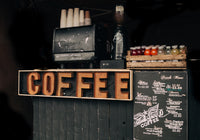- Finance
-
Shop Used Equipment
- Beverage
- Coffee
-
Cooking
- Shop all cooking
- Bratt pans
- Char grills
- Chicken rotisseries
- Combi ovens
- Contact grills
- Convection ovens
- Conveyor toasters
- Conveyor, deck and pizza ovens
- Cooktops
- Cooktop oven combos
- Crepe and pancake makers
- Fryers and oil filters
- Griddles
- Microwaves
- Pasta cookers
- Range ovens
- Rice cookers
- Salamander grills
- Sous vide
- Tandoor ovens
- Toaster Grills
- Vertical broilers
- Waffle and crepe makers
- Wok burners
- Other cooking equipment
- Dishwashers
- Food display
-
Food preparation
- Shop all food preparation
- Blenders
- Dough rollers and sheeters
- Food processors
- Fruit and veg prep
- Ice-cream machines
- Juicers
- Mixers
- Pizza prep tables
- Proofing and warming cabinets
- Sandwich and salad prep tables
- Slicers and grinders
- Sushi makers
- Vacuum packaging machines
- Other food preparation equipment
- Point of sale
-
Refrigeration
- Shop all refrigeration
- Back bar coolers and kegerators
- Blast chillers/freezers
- Chef bases
- Chest freezers
- Countertop fridges
- Display freezers
- Display fridges
- Gelato freezers
- Ice-cream machines
- Ice machines and bins
- Pizza prep tables
- Reach-in freezers
- Reach-in refrigerators
- Sandwich and salad prep tables
- Slushy machines
- Under counter freezers
- Under counter fridges
- Other refrigeration equipment
- Restaurant furniture
- Stainless steel
- Spring Clean Out
- Shop all equipment
- Customers
- FAQs
- Resources
- About Us
Share
How to select the right coffee machine in four steps
article
A hospitality business can offer a lot to its customers. With a massive competition in Canada’s tourist hotspots, it may be difficult to stand out. Attention to detail and the small things will often make the difference between a superb hospitality spot and a mediocre one.
Investing in your own commercial coffee machine is a perfect idea. Coffee aficionados will appreciate the chance to enjoy their delicious, favourite beverage away from home. In order to give your clients the best coffee, however, you have to pick a high-quality machine.
Types of Coffee You Want to Make
Will you serve your guests espresso? Cappuccino? Americano? This is the first question to ask yourself because it will be determining for the parameters of the coffee-making equipment you’re going to get.
Based on these considerations, you can look at the pressure, the length of pour, coffee grinding options and all other characteristics that will affect the strength and the flavour of the caffeinated (or decaffeinated) beverages you’re going to make.
Capacity
The second big consideration is the capacity of the coffee maker. Think about the busyness of your venue and the amount of space you can dedicate to the placement of a coffee machine. Most commercial coffee machines can produce anywhere between four and eight cups of coffee simultaneously. The capacity will be dependent on the number of group heads.
A machine could also come with a specification concerning the number of coffee cups it can make per day. As far as commercial equipment goes, the typical output is from 150 to 250 cups of coffee per day.
Boiler Considerations
Most coffee machines on the market fall in several categories – single boiler, twin boiler or a heat exchanger machine. A single boiler machine can do one thing at a time. This means that if you have to make an espresso and a cappuccino, you’ll first have to deal with one task and then move on to the next one.
A twin boiler or a heat exchanger machine is a much better pick for busy hospitality venues. These machines allow the user to make an espresso and steam milk at the same time, making it possible to service customers much faster.
The difference between a twin boiler and a heat exchanger machine is that the second one has a single boiler that has a tube inside for the purpose of brewing water use. Some professionals prefer this option because the brewing water doesn’t come in contact with the heater, which could potentially have a beneficial impact on purity and taste.
An Automatic or a Semi-Automatic Machine?
As you can see, the configurations are endless. Another factor to think about is whether to opt for an automatic or a semi-automatic machine. With the semi-automatic machine, the barista will still have to perform some manual tasks. These may include controlling the amount of water or just how fine the coffee is ground. An automatic machine is quick and easy because it does everything by itself. Choosing one or the other depends entirely on the experience of the barista and their preferences.
One final thing to keep in mind is that the price of a commercial coffee machine will vary significantly from one brand to another. The brand, however, does matter and it’s a good idea to spend a bit more on high quality and years of maintaining a positive reputation. This way, you can rest assured that the investment in the coffee machine will deliver benefits for years to come and that your guests will be perfectly satisfied.
